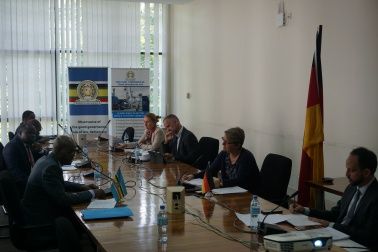The East African Community Secretariat and the German Government successfully concluded negotiations on future development cooperation on the 24th of November at the EAC Secretariat in Arusha, Tanzania. In total, Germany committed up to 42.9 Million Euros for the next two years. Out of this, 15.9 Million Euros are intended for Technical Cooperation.
H.E. Libérat Mfumukeko, Secretary General of the EAC, expressed his appreciation for the cooperation, “We are cooperating in critical sectors. Our joint programmes touch the lives of the ordinary East African citizen.” For the German side, Marcus von Essen, Head of the East Africa Division at the Federal Ministry for Economic Cooperation and Development (BMZ), complimented the EAC and its Partner States for the economic integration steps already achieved, including the customs union and the common market protocol. Looking forward, he stressed that Germany will continue to support the Community in harvesting the fruits of these integration steps by further deepening cooperation in the long-standing programmes on regional and social integration.
To this end, new commitments of 11.3 Million Euros were made for the continuation of the “Support to East African Market-Driven and People-Centred Integration” (SEAMPEC) project, implemented by GIZ. The new SEAMPEC phase will build on already achieved results to support regional economic integration such as generating added value in selected agro-processing sectors, the pharmaceutical sector, and in service sectors by improving the regulatory framework and reducing trade barriers.
SEAMPEC creates synergies with other projects in areas such as digital skills development, e-Commerce and AfCFTA and cooperates closely with the private sector. It receives co-financing from the European Union for the EU-EAC Market Access Upgrade Programme (MARKUP) which focuses on selected agri-business and horticultural sectors, aiming to increase access of East African products to European and international markets. Furthermore, SEAMPEC is complemented by the global programme “Fund for Agricultural Policy Advice and Innovation” for the development of a functioning seed potatoes market in the EAC. With respect to the new commitments, Kirsten Focken, Cluster Coordinator for East African Community Cooperation, emphasised, “GIZ continues to work closely with our key partners in the EAC in supporting the priority areas of regional integration to achieve positive results for people in the region. In the future, increasing attention within the support on regional economic integration will be paid to the mitigation of the economic impact of COVID-19.”
Regarding the pandemic, Mr von Essen commended the EAC for its strong role in the ongoing fight against COVID-19 in East Africa. Referring to the EAC-German cooperation in the health sector, he emphasized its preparedness to swiftly react to the pandemic, “We could build on the foundations that had been laid long before the COVID-19 pandemic struck – testing capacities could be made available quickly and cross-border cooperation created leverage in containing its further spread. Investments in human capital and laboratory equipment will continue to keep the regional level of preparedness high.” In this regard, the impact of the “Support to Pandemic Preparedness project” implemented by GIZ was highlighted. The project aims at strengthening the advisory and coordinating role of the EAC Secretariat in infectious diseases preparedness and response.
All in all, the governments negotiations paved the way for a deepened partnership on regional economic integration between Germany and the EAC.
Photo: ©EAC-GIZ
